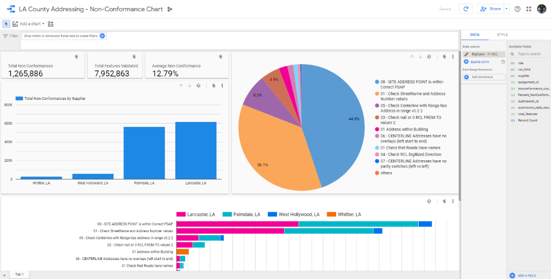Providing Executive Leadership Data Quality Trends using the 1Integrate Google BigQuery DataStore
Supplying Google With 1Integrate:
I’m really excited that 1Spatial’s 1Integrate product is now supporting the Google BigQuery datastore type. This will enable easier integrations and visibility of data management workflows within BI platforms like BigQuery.
1Spatial’s 1Integrate technology is a rules-based-engine for validating, integrating and enhancing geospatial and non-spatial datasets. These rules are configurable to truly match the business rules that are determined by subject matter experts and data governance teams. The 1Integrate software can connect into many different sources of data including datasets from spatial, non-spatial, enterprise systems and flat files.
While working with new clients we find executive leadership often does not trust the quality of their data. In fact, in a study on data quality, it was found that less than 50% of companies claim to be very confident in their data1. When we dig even deeper, these executives are typically going by gut instincts and don’t necessarily have hard numbers to back up their mistrust of the data. The executives in many cases are going by the loudest complaints from users of their data. The data may be of poor quality, but executives must determine if the quality of the data puts their company at risk and then determine how to mitigate those risks.
To accomplish identifying and mitigating the risks of poor data quality there must be good data management science to help make informed decisions. At 1Spatial we work with many organisations to perform data quality audits and then implement automated data management workflows to ensure the data quality is steadily improving over time. Driving this type of visibility to the executive level requires the information be distilled in an easily digestible dashboard.
In the past, when we implemented data management solutions the results would be written out to flat files like GIS Shapefiles, Esri File Geodatabases or CSV files and the data stewards could edit the data locally in their data editing application of choice. This paradigm works extremely well to get the data cleansed in an efficient way, but it didn’t give oversight to the organisation’s leadership to really understand the trends of their data quality. Typically, in these engagements, 1Spatial consultants would write results out to databases such as Oracle, SQL Server or Postgres and then tie those databases to BI tools.

While working with Google’s Real Estate Worldwide Services (REWS) group, we implemented Google’s BigQuery 1Integrate datastore to streamline reporting directly to BigQuery which is the operational dashboard and BI toolset that Google REWS and the rest of Google uses. With the addition of the Google BigQuery 1Integrate Datastore, we can now connect directly to a BI System like Google BigQuery, write out the results, and instantly be able to slice and dice the quality findings in a variety of ways using the rich features of Google’s BigQuery.
According to Yvonne Reshatar, Global Data Integrity Manager at Google, “Using Big Query to pull information from 1Integrate is a huge step in helping us to more efficiently review non-compliance issues as well as build dashboards to monitor trends in the data”.

This now equips executive leadership with clear insight to the data quality trends in a readily digestible dashboard format, providing them with a better understanding of the quality of the data in their systems and ensuring that they can rely on this data (or not) in their decision support.
Learn more about how 1Spatial is helping organisations, like Google REWS, both large and small, better manage real estate holdings by improving data quality for better decision support by visiting our website or watching our webinar series Using a Rules-Based-Approach to Manage Large Real Estate Holding Data.
Kevin Sigwart – Director of Solutions – 1Spatial Inc.
1 Marsh, R. (2005). Drowning in dirty data? It’s time to sink or swim: A four-stage methodology for total data quality management. Database Marketing & Customer Strategy Management, 12(2), 105–112. doi:10.1057/palgrave.dbm.3240247

